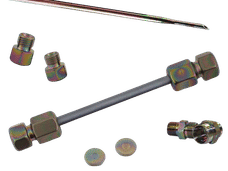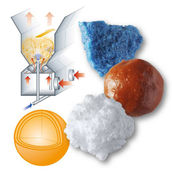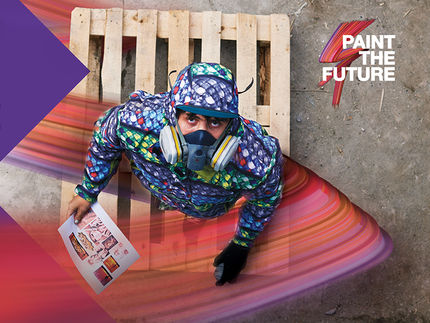PLEXIGLAS®: Innovations for a classic plastic
At ACHEMA 2003, the Plexiglas Business Unit of Degussa AG, Düsseldorf, will demonstrate that a classic like PLEXIGLAS® also belongs in the area of "Advanced Materials." The versatility of this plastic is clear from the business unit's booth, which is largely devoted to Plexiglas. With an extensive program of solid and multi-skin sheets, corrugated sheets, tubes, and rods, Degussa stands among the worldwide leading manufacturers of acrylic glass, whose multitude of potential designs can also be seen on display at this show-usually with impressive interior lighting effects.
Thermoplastic acrylic glass (chemically correct name: polymethyl methacrylate, or PMMA; Degussa trade name: PLEXIGLAS®) was invented by Otto Röhm as early as 1933, but with new application-oriented developments, such as special surface-functional coatings, the material still stands among the most innovative and advanced plastics. One kind of material helps prevent graffiti on public facilities. The coating is chemical-resistant, difficult to wet, and has a low surface energy, which makes it both hydrophobic and oleophobic. This effect is produced by small amounts of special fluorine compounds. Since graffiti sprays such as acrylic-based automobile repair paint won't flow on this surface, a coherent image can't be created-an effect meant to act as a deterrent.
Another possibility is titanium oxide-based anti-soiling coatings that are photocatalytically active and hydrophilic. The coating is activated through exposure to UV light and atmospheric humidity, and has a photo-oxidative effect with regard to organic pollutants. Tire wear, grease, or oil that deposit on PLEXIGLAS® noise barriers disintegrate to carbon dioxide and water.
"NO DROP" coatings are based on silica sols, which increase the wettability of the acrylic glass surface. Rainwater or condensate forms a thin film on it that flows evenly, thus washing away the dirt. Long used on greenhouses and winter gardens, the coating has now been adapted for noise barrier sheets. Normally, these are thermoformed through special designs to reflect traffic noise onto the road, for example. The modified NO DROP layer also retains its effectiveness and transparency after thermoforming. On vertical noise barriers it causes the dirt to run off with the rainwater, thereby maintaining a clear view.
Degussa has developed a transparent cross-linked UV coating for antistatic semi-finished products made of PLEXIGLAS®. Antistatic coatings are meant to prevent the electrostatic charging of plastic surfaces-a phenomenon that leads to sudden discharges that can damage electronic components in devices such as computers. The antistatic effect of the new UV coating is based on AdNanoTM ITO, a conductive indium tin oxide (ITO) produced and marketed by Degussa Advanced Nanomaterials. The indium tin oxide particles are dispersed evenly throughout the coating matrix. If electrical loading occurs through friction, for example, it can be immediately discharged by the conductive particles. In addition to the antistatic effect, this nearly transparent coating is also more scratch and chemical resistant than uncoated PMMA. Degussa is currently working on a coating process suitable for production.
Other news from the department research and development
These products might interest you

Dursan by SilcoTek
Innovative coating revolutionizes LC analysis
Stainless steel components with the performance of PEEK - inert, robust and cost-effective

OCA 200 by DataPhysics
Using contact angle meter to comprehensively characterise wetting behaviour, solids, and liquids
With its intuitive software and as a modular system, the OCA 200 answers to all customers’ needs

Tailor-made products for specific applications by IPC Process Center
Granulates and pellets - we develop and manufacture the perfect solution for you
Agglomeration of powders, pelletising of powders and fluids, coating with melts and polymers

Get the chemical industry in your inbox
By submitting this form you agree that LUMITOS AG will send you the newsletter(s) selected above by email. Your data will not be passed on to third parties. Your data will be stored and processed in accordance with our data protection regulations. LUMITOS may contact you by email for the purpose of advertising or market and opinion surveys. You can revoke your consent at any time without giving reasons to LUMITOS AG, Ernst-Augustin-Str. 2, 12489 Berlin, Germany or by e-mail at revoke@lumitos.com with effect for the future. In addition, each email contains a link to unsubscribe from the corresponding newsletter.




























































